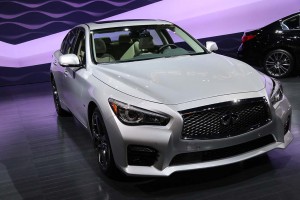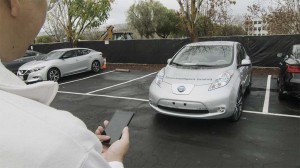
The Infiniti Q50 already offers a steer-by-wire system that would readily enable autonomous driving.
Luxury brand Infiniti is likely to add semi-autonomous driving capabilities to most of its new models, the Nissan subsidiary’s president said, during an appearance at a global auto industry summit in Chongqing, China.
The move would potentially put Infiniti on a par, and perhaps ahead, of key luxury rivals in the race to bring fully self-driving vehicles on the road by the early part of the coming decade. And Infiniti’s announcement would echo the aggressive goals of Nissan CEO Carlos Ghosn, who has said the second-largest Japanese automaker wants to have as many as 10 autonomous vehicles in production by 2020.
“This will be rolled out as we are launching new vehicles one by one,” Roland Krueger, Infiniti’s president, told the Reuters news service.
(New study sees 21 million autonomous vehicles on the road by 2035. Click Here for the latest.)
Infiniti has already set the stage with a key technology that will readily enable autonomous technology: its Q50 sedan offering an optional steer-by-wire system, eliminating the traditional, mechanical link between the steering wheel and a vehicle’s tires.
(GM CEO says autonomous vehicles should retain steering wheel, pedals. Click Here for the latest.)
Initially, at least, Infiniti plans to limit its autonomous technology to allow hands-free driving on limited-access highways. That appears to be similar, at least in concept, to the AutoPilot system introduced by Tesla Motors on its Models S and X.

Infiniti parent Nissan is already working on autonomous vehicles, a self-driving Nissan Leaf shown here parking on its own.
More advanced, self-driving technology is in the works, but Infiniti’s Krueger cautioned that additional steps, including improvements in highway infrastructure, will be needed. There also will need to be changes in regulations.
Autonomous vehicle proponents are pressing for new rules that would support testing and, eventually, the sale of self-driving vehicles. They emphasize the potential benefits of the technology, such as improving traffic flow, reducing fuel consumption, and saving lives. That has particular resonance in China, where the unofficial highway death count is as much as 250,000 lives annually.
The Chinese government has expressed support for autonomous vehicles, as had the Department of Transportation in the U.S. The National Highway Traffic Safety Administration is preparing to issue new guidelines promoting and regulating the technology later this year.
Virtually all major automakers have some form of autonomous vehicle development program in the works. General Motors recently spent $1 billion to purchase Cruise Technologies, a San Francisco-based firm working on self-driving technology. Toyota has invested $1 billion of its own to support a similar, in-house effort, and BMW’s CEO said last week the maker is reorganizing its R&D operations, in part, to emphasize autonomous vehicle development.
Infiniti officials said during the global auto conference that will launch an accelerator in China to spur start-ups working on smart transportation systems. The brand is already working with another start-up in Hong Kong working on an app that could help find parking spots in the densely crowded city. Eventually, it could allow an autonomous vehicle to drive to an open spot on its own.
(Hacked Mitsubishi Outlander raises new concerns about automotive cybersecurity. Click Here to learn why.)
